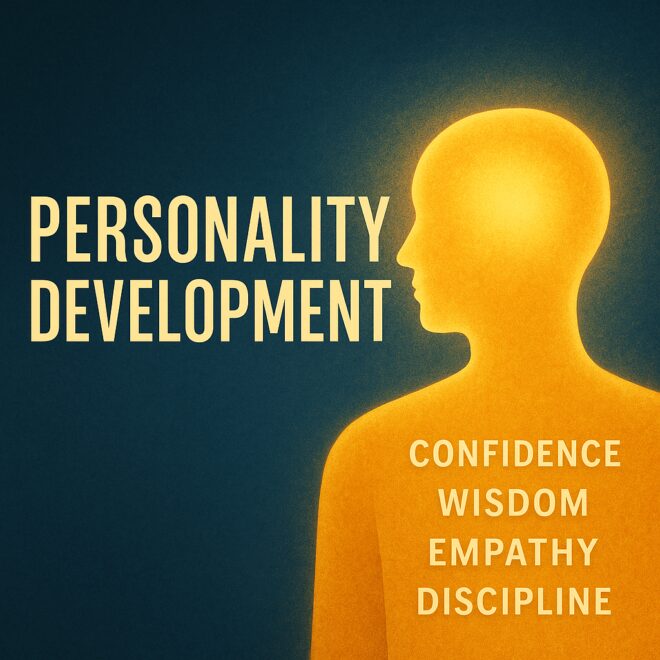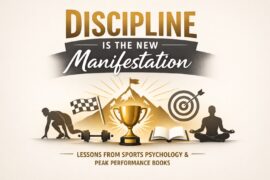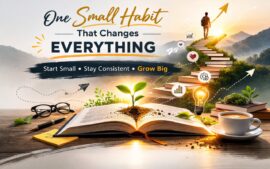Personality Development: The Science and Spirituality of Becoming Your Best Self

When people hear the word personality, they often think of surface-level traits, good looks, stylish clothes, or a charming smile. But in truth, personality is much deeper. It is the total sum of your thoughts, emotions, behaviour, values, and even the energy you radiate.
Personality is what makes you memorable in a room, what attracts opportunities, and what defines how people perceive and respond to you. In fact, many psychologists argue that personality has a stronger impact on success than intelligence or technical skills.
The good news? Personality is not fixed. While genetics and upbringing play a role, modern psychology, neuroscience, and spiritual traditions all agree: your personality can be consciously developed.
Books like How to Win Friends and Influence People (Dale Carnegie) prove that social skills can be learned. Atomic Habits (James Clear) shows how small daily actions reshape your identity. And Indian wisdom like Swadhyaya (self-study) and Sankalp (intention) remind us that inner refinement has always been at the heart of personality growth.
This blog will explore personality development from three perspectives, psychology, neuroscience, and spirituality, and offer practical steps to help you become your best self.
Defining Personality: Beyond Looks and Labels
Before we explore how to develop personality, we must first define it correctly. Personality is not just what you wear or how you speak; it is who you are when no one is watching.
Psychological Definition:
Psychologists describe personality as the collection of consistent patterns in how a person thinks, feels, and behaves. It is shaped by both nature (genetics) and nurture (environment, upbringing, and choices).
One of the most widely accepted frameworks is the Big Five Personality Traits (OCEAN):
- Openness to Experience – curiosity, creativity, willingness to learn.
- Conscientiousness – discipline, responsibility, dependability.
- Extraversion – sociability, confidence, energy.
- Agreeableness – empathy, kindness, cooperation.
- Neuroticism – emotional stability (lower levels = calmer, resilient).
These traits influence everything from career success to relationships. But the key insight is: traits are not destiny. Research shows they can shift with conscious effort.
Surface Personality vs Core Personality:
- Surface personality includes appearance, speech, and mannerisms.
- Core personality includes values, beliefs, mindset, and emotional maturity.
Many focus only on the surface, but true development comes from refining the core. For example, a well-dressed person may appear confident, but if they lack self-awareness or empathy, their personality will not create lasting impact.
Book Reference: In Personality Plus by Florence Littauer, she explains that understanding your own temperament (choleric, sanguine, melancholic, phlegmatic) is the first step. Self-awareness helps you enhance strengths and manage weaknesses.
Spiritual Angle: Ancient Indian wisdom also viewed personality (vyaktitva) as both inner and outer expression. Vyakti means “manifested self.” In other words, your personality is your soul expressed through behavior and action.
True personality development, therefore, is about aligning your outer image with your inner values and highest potential.
The Psychology of Personality Development
Psychology has long been fascinated with the question: What makes us who we are? For decades, psychologists have studied how personality is shaped — and how it can evolve.
Freud’s Theory (Id, Ego, Superego):
Sigmund Freud believed our personality is driven by three forces:
- Id – primal desires and instincts (the child within us).
- Ego – the rational self that negotiates with reality.
- Superego – our inner moral compass, influenced by society and upbringing.
Though Freud’s theories are debated today, they remind us that personality is a balance of desire, discipline, and values.
Carl Jung’s Archetypes:
Carl Jung introduced the concept of archetypes (hero, caregiver, rebel, sage, etc.), which live in our subconscious and shape how we express ourselves. He also popularized the introvert–extrovert spectrum, showing personality is not fixed but exists in fluid ranges.
Modern Psychology – Growth Mindset:
Psychologist Carol Dweck’s Mindset introduced the idea of a growth mindset vs a fixed mindset. People with a growth mindset believe they can learn and improve and this belief itself transforms personality. For example, a shy student who embraces growth mindset may, over time, develop into a confident speaker.
Role of Conditioning:
Behavioral psychology shows personality is influenced by conditioning. If rewarded for confidence as a child, you’re likely to grow more extroverted. The good news? Conditioning can be rewired through deliberate practice.
Book Reference: Dale Carnegie’s How to Win Friends and Influence People is essentially a psychological guide to personality development. It teaches timeless lessons: show genuine interest in others, smile, use people’s names, and listen actively all rooted in simple psychological truths about human connection.
Key Insight: Psychology teaches us that personality is malleable, not permanent. With awareness and practice, anyone can reshape their personality.
Neuroscience and Habit Formation
If psychology explains the why, neuroscience explains the how. Personality is not something mystical; it is deeply connected to the way our brain wires itself through habits and repeated experiences.
1. Neuroplasticity – The Brain Can Change
Neuroscience has proven that the brain is plastic it can rewire itself throughout life. Every time you practice a new behaviour (like speaking confidently or staying calm), you strengthen neural circuits that support that trait. Over time, this becomes part of your personality.
2. Habits Shape Identity
James Clear, in Atomic Habits, explains: “Every action you take is a vote for the person you want to become.” Habits are not just behaviors; they are building blocks of identity.
- Reading daily makes you a curious, informed person.
- Exercising regularly makes you disciplined.
- Practicing gratitude makes you positive and resilient.
Your personality is essentially the sum of the habits you live by.
3. Reticular Activating System (RAS):
The RAS in the brain acts as a filter, noticing what aligns with your dominant thoughts. If you repeatedly affirm, “I am confident,” your RAS will highlight opportunities to prove it, strengthening that trait in your personality.
4. Visualization and Mental Rehearsal
Neuroscience shows that imagining a scenario activates the same brain regions as actually experiencing it. This means practicing confidence, empathy, or leadership in your mind literally prepares your brain to embody those traits in reality.
Book Reference: Maxwell Maltz, in Psycho-Cybernetics, demonstrated how visualization rewires self-image. He showed that people who saw themselves as confident, successful, and worthy eventually manifested those qualities.
Key Insight: Neuroscience confirms that personality is not destiny. By rewiring your brain through habits, affirmations, and visualization, you can consciously design your personality.
Personality Development Through Communication & Social Skills
No matter how intelligent or skilled you are, your personality shines (or fades) through the way you connect with people. Communication is the bridge between your inner world and the outer world. Strong personalities are remembered not only for what they know, but for how they make others feel.
1. Listening as the Core Skill
Dale Carnegie, in his timeless classic How to Win Friends and Influence People, emphasized that being a good listener is more powerful than being a great talker. When you give someone your full attention, you make them feel valued and that instantly makes your personality magnetic.
2. Non-Verbal Communication
Research shows that over 70% of communication is non-verbal. Your body language, tone, eye contact, and posture all broadcast confidence (or insecurity). Even a smile can change how people perceive you.
3. Empathy and Influence
Great communicators tune into emotions. They empathize, adapt their words, and influence without manipulation. This creates trust a cornerstone of a strong personality.
4. Presence and Charisma
Think of leaders like Martin Luther King Jr. or Mahatma Gandhi. Their words were powerful, yes but their presence, calmness, and authenticity were equally influential.
Practical Tip: Practice active listening. Repeat back what you heard in your own words. This shows attentiveness and deepens connection.
Book References:
- How to Win Friends and Influence People (Carnegie) for influence.
- The Charisma Myth (Olivia Fox Cabane) for building presence.
Key Insight: Personality is not about dominating conversations; it’s about creating authentic, impactful connections.
Emotional Intelligence and Self-Mastery
If communication is the outer pillar of personality, emotional intelligence (EQ) is the inner foundation. Daniel Goleman’s groundbreaking book Emotional Intelligence proved that EQ often matters more than IQ for success in life and leadership.
1. Self-Awareness
Understanding your emotions is the first step. Without awareness, emotions control you. With awareness, you control them.
2. Self-Regulation
A developed personality is not one that never feels anger or fear it is one that manages those emotions skillfully. As the Bhagavad Gita says: “योगस्थः कुरु कर्माणि” (Yogasthaḥ Kuru Karmāṇi) Stay balanced and perform your actions.
3. Motivation
High EQ individuals are driven by inner purpose, not external validation. They sustain discipline and optimism even in tough times.
4. Empathy
Being able to feel what others feel is a superpower in relationships. Empathy builds trust, compassion, and harmony essential elements of a strong personality.
5. Social Skills
EQ enhances teamwork, conflict resolution, and leadership. It transforms personality from self-centered to community-centered.
Practical Tools to Build EQ:
- Journaling daily emotions and triggers.
- Practicing gratitude (shifts focus from lack to abundance).
- Meditation and breathwork to calm the nervous system.
Book References:
- Emotional Intelligence (Daniel Goleman) for frameworks.
- The Power of Now (Eckhart Tolle) for presence and emotional awareness.
Key Insight: Emotional intelligence is what transforms knowledge into wisdom, and behavior into character. Without EQ, personality lacks depth.
Spiritual Roots of Personality Development in India
While modern psychology and neuroscience emphasize habits and mindset, India has always treated personality (vyaktitva) as a spiritual journey the manifestation of the inner self.
1. Swadhyaya (Self-Study)
One of the Niyamas (discipline practices) in Patanjali’s Yoga Sutras, Swadhyaya means studying oneself through scriptures, reflection, and awareness. This is essentially personality development at the soul level refining your thoughts, values, and actions daily.
2. Sankalp (Sacred Intention)
In Vedic rituals, no practice begins without a Sankalp: a clear, conscious declaration of intention. Setting intentions aligns your inner personality with outer action. Similarly, personality growth requires conscious commitment: “I will become disciplined, empathetic, and wise.”
3. Bhagavad Gita’s Lessons on Personality
- “योगः कर्मसु कौशलम्” (Yogah Karmasu Kaushalam): Yoga is skill in action. True personality shines not in words but in balanced, skillful actions.
- “उद्धरेदात्मनात्मानं” (Uddhared Atmanatmanam): Lift yourself by your own mind. Personality development is self-driven, not dependent solely on external validation.
4. Great Leaders as Models
- Swami Vivekananda embodied fearlessness, clarity, and service. His personality continues to inspire youth worldwide.
- Mahatma Gandhi demonstrated how humility and truth could influence millions, proving personality is not loudness, but inner strength.
Key Insight: In Indian philosophy, personality development is not about “adding” traits, but uncovering your true self by aligning with dharma (right action) and higher consciousness.
Practical Steps to Start Your Personality Development Journey
Knowing the theory is important, but personality changes only when practiced consistently. Here’s a step-by-step guide to begin your journey:
1. Self-Awareness Audit
Write down your strengths, weaknesses, and values. Ask: “What do I want to be known for?” Awareness is the foundation of growth.
2. Build Keystone Habits
Pick 2–3 habits that ripple across your life: like waking up early, journaling, or exercising. Habits don’t just shape behaviour; they reinforce identity.
3. Read and Reflect
Books are the cheapest mentors. Read self-help classics (Atomic Habits, Think and Grow Rich, How to Win Friends) and spiritual texts (Bhagavad Gita, Upanishads). Reflect daily on one idea and apply it.
4. Practice Communication Daily
Engage in conversations with empathy. Notice your tone, body language, and ability to listen. Record yourself if needed: awareness improves presence.
5. Develop Emotional Mastery
- Meditate 10 minutes daily.
- Practice gratitude journaling.
- Respond instead of reacting to triggers.
6. Seek Mentorship and Feedback
Personality grows faster when shaped by mentors or role models. Be open to constructive feedback and course-correct regularly.
7. Service (Seva)
Contributing to others builds humility, compassion, and confidence. Personality grows when it shifts from “me” to “we.”
Example: A student begins journaling every night, practices gratitude, and reads The 7 Habits of Highly Effective People. Within months, friends notice they’re calmer, clearer, and more confident. This is real personality development in action.
Common Pitfalls in Personality Development
While many people start the journey of personality development with excitement, they often fall into traps that stall progress. Being aware of these mistakes ensures steady growth:
1. Focusing Only on Appearance
Looking sharp matters, but personality is much more than clothes or style. A polished exterior without inner depth may impress briefly but doesn’t inspire lasting respect.
2. Comparing With Others
Constantly measuring yourself against others creates insecurity. True growth comes from competing with your past self, not someone else’s highlight reel.
3. Consuming Without Applying
Reading dozens of books or attending workshops without practice leads to “knowledge obesity.” Application, even of one small idea, is better than passive consumption.
4. Chasing Quick Fixes
Some people expect overnight transformation. But personality development is a gradual process like sculpting stone into a statue, it requires time, effort, and patience.
5. Ignoring Core Values
Adopting superficial behaviors that don’t align with your values leads to inconsistency. Authentic personality shines when your actions, words, and inner beliefs are in harmony.
Fix: Be authentic, practice consistently, and focus on progress rather than perfection.
Conclusion: The Journey of Becoming Your Best Self
Personality development is not about becoming someone else it’s about becoming the best version of yourself. It is a lifelong journey where psychology, neuroscience, and spirituality meet.
- Psychology teaches us that personality is shaped by beliefs, mindset, and conditioning.
- Neuroscience shows us how habits, neuroplasticity, and visualization literally rewire the brain.
- Spirituality reminds us that true personality is vyaktitva the expression of your higher self through values and actions.
Great books like Atomic Habits, How to Win Friends and Influence People, and Emotional Intelligence, along with Indian wisdom from the Bhagavad Gita and Yoga Sutras, all echo one truth: you are not fixed; you are evolving.
Every small act listening better, journaling emotions, practicing gratitude, or reading with reflection is a step toward personality refinement. Over time, these steps compound into a personality that radiates confidence, empathy, and inner strength.
As Swami Vivekananda said: “You have to grow from the inside out. None can teach you, none can make you spiritual. There is no other teacher but your own soul.”
So start today. Pick one habit, one reflection, or one intention, and nurture it. Slowly, steadily, you will sculpt your destiny not by chance, but by the personality you develop.
Explore more topics:
Want to Get Rich? These 5 Books Will Show You How
India’s Best Law of Attraction & Manifestation Coach : Dr Amiett Kumar
Explore More from Dr Amiett Kumar:
Design Your Dream Life: The Ultimate Manifestation Vision Blueprint













